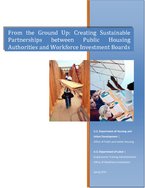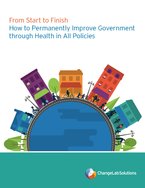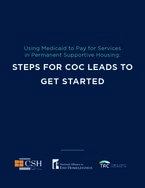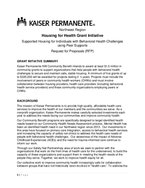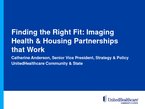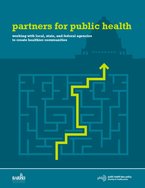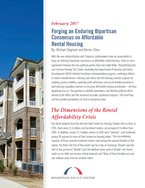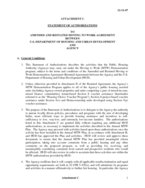0
Publication
Community:
Jul 20, 2018
The involvement of public-private partnerships in housing programs has grown steadily since HUD’s formation in 1965. Depending on their goals, previous administrations have framed P3s as a means of either expanding or reducing the federal government’s role in housing and urban development.
Authored by:
Topics: Community development, Funding, Legislation & Policy, Partnerships, Research
 Shared by Housing Is
Shared by Housing Is
Housing Is posted a
on Jul 20, 2018
The involvement of public-private partnerships in housing programs has grown steadily since HUD’s formation in 1965. Depending on their goals, previous administrations have framed P3s as a means of either expanding or reducing the federal government’s role in housing and urban development.
0
Publication
Community:
Jul 19, 2018
Assisting public housing residents on the path towards self-sufficiency requires going beyond providing decent, safe, and affordable housing. Public housing residents may face barriers to employment, such as limited education, job skills and/or proficiency in the English language. This toolkit is a resource for both frontline staff and management. It offers examples of how partnerships between DOL and HUD can increase public housing resident employment and create mutual benefit for both agencies.
Authored by:
Topics: Criminal justice, Disabilities, Funding, Housing, Legislation & Policy, Low-income, MTW, Partnerships, Workforce development
 Shared by Housing Is
Shared by Housing Is
Housing Is posted a
on Jul 19, 2018
Assisting public housing residents on the path towards self-sufficiency requires going beyond providing decent, safe, and affordable housing. Public housing residents may face barriers to employment, such as limited education, job skills and/or proficiency in the English language.
0
Publication
Community:
Jul 19, 2018
Young adults ages 18-24 require specific, targeted services and interventions from the juvenile justice and homelessness service providers with whom they interact if they are to achieve successful outcomes and avoid longterm harms. This resource is intended to assist policymakers, practitioners, and other stakeholders in applying an earlier report, “Addressing the Intersections of Juvenile Justice Involvement and Youth Homelessness: Principles for Change.” in their work with and on behalf of young people in this age group
who are under the jurisdiction of the juvenile justice system.
Authored by:
Topics: Criminal justice, Homelessness, Partnerships, Racial inequalities, Youth
 Shared by Housing Is
Shared by Housing Is
Housing Is posted a
on Jul 19, 2018
Young adults ages 18-24 require specific, targeted services and interventions from the juvenile justice and homelessness service providers with whom they interact if they are to achieve successful outcomes and avoid longterm harms.
0
Publication
Community:
Jul 18, 2018
Health in All Policies is a collaborative approach to improving the health of a community by incorporating health, sustainability, and equity considerations into decision-making across sectors and policy areas. One of the key objectives of Health in All Policies is to create lasting change in government structures and processes.
Authored by:
Topics: Community development, Health, Legislation & Policy, Partnerships, Preventative care
 Shared by Housing Is
Shared by Housing Is
Housing Is posted a
on Jul 18, 2018
Health in All Policies is a collaborative approach to improving the health of a community by incorporating health, sustainability, and equity considerations into decision-making across sectors and policy areas.
0
Publication
Community:
Jul 13, 2018
This guide is organized around five steps, each of which includes concrete ways to get started as well as links to additional resources. These five steps will help you build a case for why and how Medicaid can be structured at the state and local levels to pay for services in permanent supportive housing. When building a case you need to know some basics of Medicaid and the types of services you want Medicaid to cover. in order to convince Medicaid administrators and other health care payers to support your efforts, you need to have evidence of need for and impact of supportive housing and you need a coalition of many stakeholders at your side.
Authored by:
Topics: Affordable Care Act, Data sharing, Funding, Health, Homelessness, Medicaid / Medicare, Partnerships, Supportive housing
 Shared by Housing Is
Shared by Housing Is
Housing Is posted a
on Jul 13, 2018
This guide is organized around five steps, each of which includes concrete ways to get started as well as links to additional resources.
0
Publication
Community:
Jul 13, 2018
This paper offers strategic guidance in building, assessing and/or strengthening various types of partnerships between Health Center Program Grantees, behavioral health providers and supportive housing providers. Whether you represent one of these types of organizations or you are merely curious about health and housing partnerships, you can use this guide as your roadmap.
Authored by:
Topics: Data sharing, Dual-eligibles, Health, Low-income, Medicaid / Medicare, Partnerships, Supportive housing
 Shared by Housing Is
Shared by Housing Is
Housing Is posted a
on Jul 13, 2018
This paper offers strategic guidance in building, assessing and/or strengthening various types of partnerships between Health Center Program Grantees, behavioral health providers and supportive housing providers.
0
Publication
Community:
Jul 13, 2018
Recognizing the layers to developing a health and housing partnership, this Literature Review and Resource Bank is intended to provide background and data resources that can be used in grant applications or in conversations with potential funders in the effort to foster new health and supportive housing partnerships.
Authored by:
Topics: Cost effectiveness, Criminal justice, Data sharing, Dual-eligibles, Funding, Health, Homelessness, Housing, Low-income, Medicaid / Medicare, Mental health, Partnerships, Post-secondary, Preventative care, Research, Seniors, Substance abuse, Supportive housing, Youth
 Shared by Housing Is
Shared by Housing Is
Housing Is posted a
on Jul 13, 2018
Recognizing the layers to developing a health and housing partnership, this Literature Review and Resource Bank is intended to provide background and data resources that can be used in grant applications or in conversations with potential funders in the effort to foster new health and supportive hou
0
Publication
Community:
Jul 13, 2018
Authored by:
Topics: CLPHA, Data sharing, Health, Housing, Legislation & Policy, Low-income, Medicaid / Medicare, Partnerships, Preventative care, Research
 Shared by Housing Is
Shared by Housing Is
Housing Is posted a
on Jul 13, 2018
0
Publication
Community:
Jul 13, 2018
This fact sheet describes how a landlord may legally prohibit smoking in common spaces and individual units, and explains how to implement a smokefree policy in compliance with the rent control law, where applicable. It also includes options for addressing possible enforcement and compliance issues that may arise once a policy is in place.
Authored by:
Topics: Family engagement, Health, Housing, Low-income, Smoke-free, West Coast
 Shared by Housing Is
Shared by Housing Is
Housing Is posted a
on Jul 13, 2018
This fact sheet describes how a landlord may legally prohibit smoking in common spaces and individual units, and explains how to implement a smokefree policy in compliance with the rent control law, where applicable.
0
Publication
Community:
Jul 13, 2018
This guide is intended to provide information to public health department staff and advocates about the many public agencies that make policy decisions and implement projects related to the physical environment.
Authored by:
Topics: Child welfare, Community development, Education, Exercise, Green, Health, Housing, Legislation & Policy, Place-based, Safety, Smoke-free, Stability, Substance abuse, West Coast
 Shared by Housing Is
Shared by Housing Is
Housing Is posted a
on Jul 13, 2018
This guide is intended to provide information to public health department staff and advocates about the many public agencies that make policy decisions and implement projects related to the physical environment.
0
Publication
Community:
Jul 12, 2018
This brief aims to bring attention to non-Medicaid funding sources that states could potentially blend or braid to address social determinants of health and other needs that are not typically covered by Medicaid. It is intended to familiarize state Medicaid, public health, and other state policymakers with the funding streams of other agencies, and sketch out a continuum of options to help states coordinate funding to better serve the needs of low-income populations. Because this brief focuses on services for adult Medicaid beneficiaries, it does not address many of the funding sources available for children’s services. However, existing efforts to pool funds for children and youth—notably by the Commonwealth of Virginia—could prove instructive for states seeking to launch such an effort for adults.
Authored by:
Topics: Cost effectiveness, Data sharing, Dual-eligibles, Food insecurity, Funding, Health, Homelessness, Housing, Legislation & Policy, Low-income, Medicaid / Medicare, Mental health, Partnerships, Research, Substance abuse
 Shared by Housing Is
Shared by Housing Is
Housing Is posted a
on Jul 12, 2018
This brief aims to bring attention to non-Medicaid funding sources that states could potentially blend or braid to address social determinants of health and other needs that are not typically covered by Medicaid.
0
Publication
Community:
Jul 12, 2018
With the new administration and Congress, policymakers have an opportunity to forge an enduring bipartisan consensus on affordable rental housing. There is more agreement between the two political parties than one might think: Strengthening the Low-Income Housing Tax Credit, expanding the Department of Housing and Urban Development (HUD)’s Rental Assistance Demonstration program, continuing efforts to reduce homelessness, infusing real choice into the housing voucher program by enabling greater mobility, expanding self-sufficiency and asset-building incentives, and reducing regulatory barriers to increase affordable housing production—all have bipartisan buy-in. The question is whether lawmakers can find the political will to devote to the effort and the resources to make significant progress. This brief lays out the possible parameters of such a consensus plan.
Authored by:
Topics: Dual-generation, Funding, Homelessness, Housing, Legislation & Policy, Low-income, Mobility, RAD, Research
 Shared by Housing Is
Shared by Housing Is
Housing Is posted a
on Jul 12, 2018
With the new administration and Congress, policymakers have an opportunity to forge an enduring bipartisan consensus on affordable rental housing.
0
Publication
Community:
Jul 12, 2018
This report examines four specific aspects of the challenge before us:
• The need for a much greater supply of homes affordable to our nation’s lowest-income seniors.
• The importance of transforming homes and communities so that seniors can age with options, a desire shared by the overwhelming majority of older adults.
• The imperative to better integrate health care and supportive services with housing, recognizing that this integration has the potential to improve health outcomes for seniors and reduce the costs borne by the health care system.
• The need to deploy technologies on a far wider scale to help all Americans age successfully.
Authored by:
Topics: Cost effectiveness, Funding, Health, Home visiting, Homelessness, Housing, Legislation & Policy, Low-income, Medicaid / Medicare, Partnerships, Place-based, Preventative care, Seniors, Supportive housing
 Shared by Housing Is
Shared by Housing Is
Housing Is posted a
on Jul 12, 2018
This report examines four specific aspects of the challenge before us:
• The need for a much greater supply of homes affordable to our nation’s lowest-income seniors.
• The importance of transforming homes and communities so that seniors can age with options, a desire shared by the overwhelming ma
0
Publication
Community:
Jul 12, 2018
The purpose of the Statement of Authorizations is to delegate to the Agency the authority to pursue locally driven policies, procedures and programs with the aim of developing better, more efficient ways to provide housing assistance and incentives to self-sufficiency to low, very-low, and extremely low-income families.
Authored by:
Topics: Cost effectiveness, Family engagement, MTW
 Shared by Housing Is
Shared by Housing Is
Housing Is posted a
on Jul 12, 2018
The purpose of the Statement of Authorizations is to delegate to the Agency the authority to pursue locally driven policies, procedures and programs with the aim of developing better, more efficient ways to provide housing assistance and incentives to self-sufficiency to low, very-low, and extremely
0
Publication
Community:
Jul 12, 2018
Authored by:
Topics: Child welfare, Dental, Early childhood, Education, Exercise, Family engagement, Health, Housing, Medicaid / Medicare, Mental health, Nutrition, Partnerships, Place-based, Preventative care, Seniors, Vision
 Shared by Housing Is
Shared by Housing Is
Housing Is posted a
on Jul 12, 2018
0
Publication
Community:
Jul 10, 2018
Working Together to Meet Unmet Housing and Healthcare Needs
Authored by:
Topics: Affordable Care Act, Data sharing, Health, Homelessness, Housing, Low-income, Medicaid / Medicare, Mental health, Partnerships, Stability, Substance abuse, Supportive housing
 Shared by Housing Is
Shared by Housing Is
Housing Is posted a
on Jul 10, 2018
Working Together to Meet Unmet Housing and Healthcare Needs
0
Publication
Community:
Jun 8, 2017
A multi-faceted technical assistance resource for Public Housing Agencies and their partners who want to end homelessness. The Tookit is organized into five main sections: (1) Housing Choice Vouchers, (2) Public Housing, (3) Project-Based Vouchers, (4) Unique PHA Programs & Initiatives, (5) Primer on Homelessness ans Supportive Housing.
Authored by: Corporation for Supportive Housing (CSH)
Topics: Homelessness, Housing, Medicaid / Medicare, Partnerships, Substance abuse, Supportive housing
 Shared by Steve Lucas
Shared by Steve Lucas
Steve Lucas posted a
on Jun 8, 2017
Corporation for Supportive Housing (CSH)
A multi-faceted technical assistance resource for Public Housing Agencies and their partners who want to end homelessness.
 Shared by Housing Is
on Jul 20, 2018
Shared by Housing Is
on Jul 20, 2018
 Shared by Housing Is
on Jul 19, 2018
Shared by Housing Is
on Jul 19, 2018
 Shared by Housing Is
on Jul 19, 2018
Shared by Housing Is
on Jul 19, 2018
 Shared by Housing Is
on Jul 18, 2018
Shared by Housing Is
on Jul 18, 2018
 Shared by Housing Is
on Jul 13, 2018
Shared by Housing Is
on Jul 13, 2018
 Shared by Housing Is
on Jul 13, 2018
Shared by Housing Is
on Jul 13, 2018
 Shared by Housing Is
on Jul 13, 2018
Shared by Housing Is
on Jul 13, 2018
 Shared by Housing Is
on Jul 13, 2018
Shared by Housing Is
on Jul 13, 2018
 Shared by Housing Is
on Jul 13, 2018
Shared by Housing Is
on Jul 13, 2018
 Shared by Housing Is
on Jul 13, 2018
Shared by Housing Is
on Jul 13, 2018
 Shared by Housing Is
on Jul 12, 2018
Shared by Housing Is
on Jul 12, 2018
 Shared by Housing Is
on Jul 12, 2018
Shared by Housing Is
on Jul 12, 2018
 Shared by Housing Is
on Jul 12, 2018
Shared by Housing Is
on Jul 12, 2018
 Shared by Housing Is
on Jul 12, 2018
Shared by Housing Is
on Jul 12, 2018
 Shared by Housing Is
on Jul 12, 2018
Shared by Housing Is
on Jul 12, 2018
 Shared by Housing Is
on Jul 10, 2018
Shared by Housing Is
on Jul 10, 2018
 Shared by Steve Lucas
on Jun 8, 2017
Shared by Steve Lucas
on Jun 8, 2017





